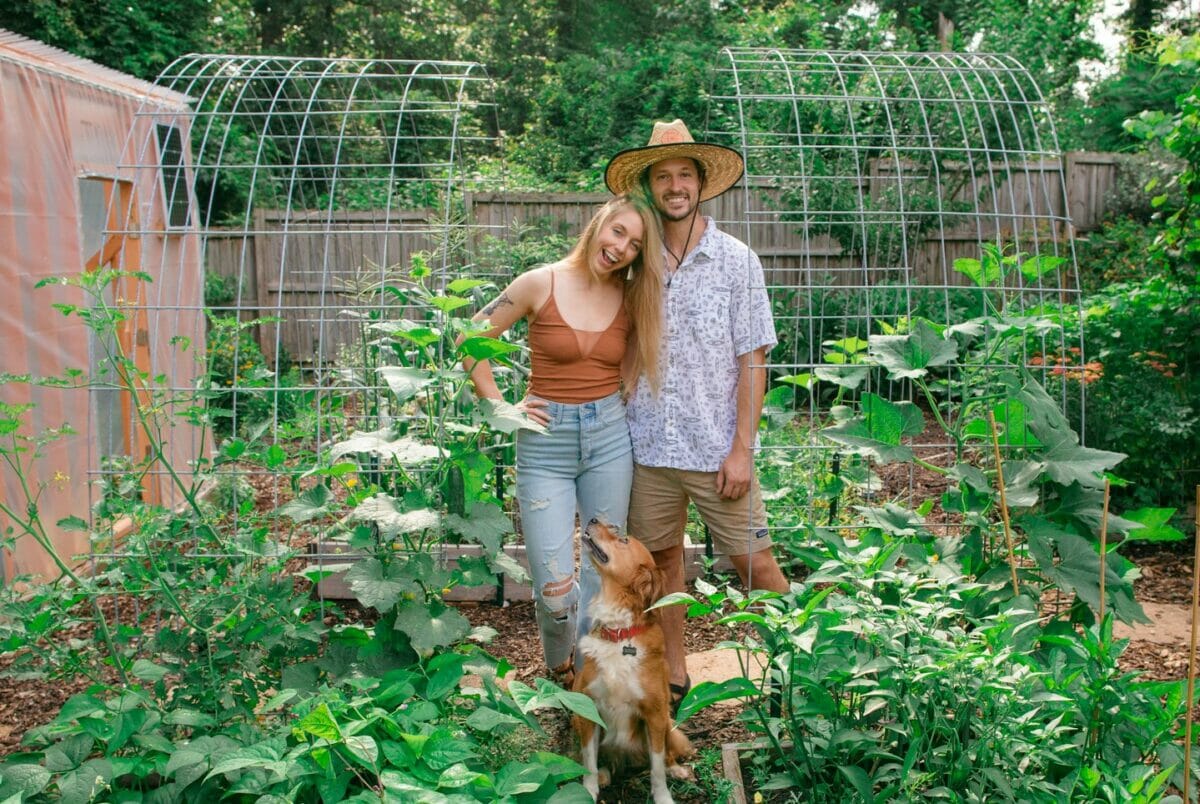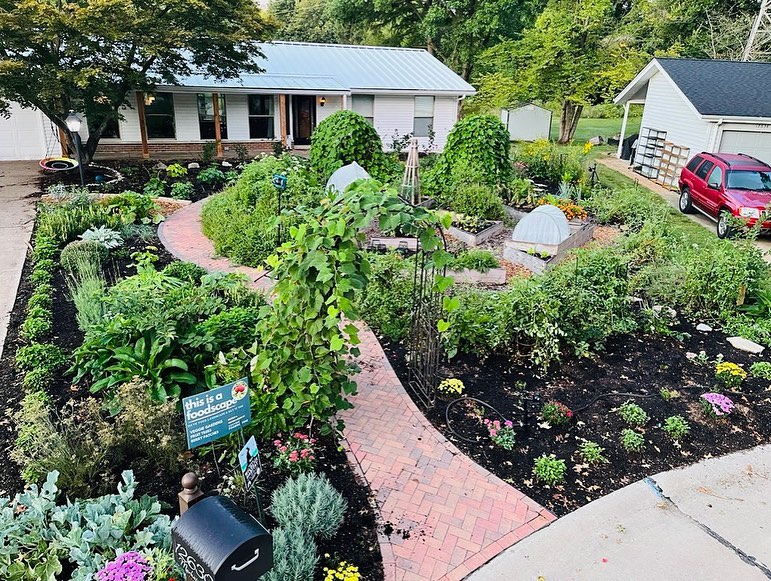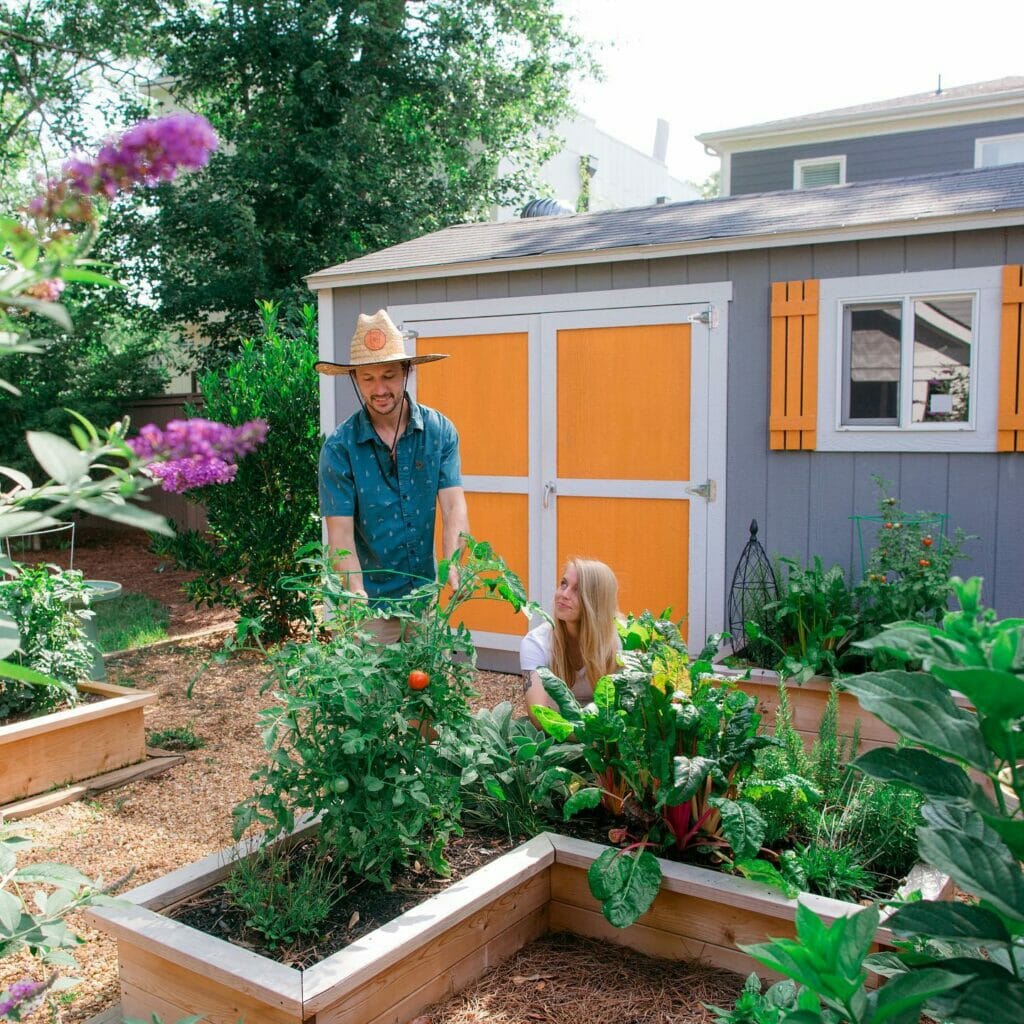Landscapers are making private and public spaces more useful, and planting edible alternatives to traditional plants.

Daniel Mobley was one of the many people laid off from their job at the beginning of the pandemic. No longer a recreation director, Mobley was in need of a hobby to help fill his newfound free time. He found inspiration in his backyard garden.
The Atlanta resident embraced the challenge of turning his suburban yard into a mini-farm, reimagining the space and installing fruit trees and bushes. Together with his wife, Sarah, Mobley posted on social media about his home garden, which quickly grew to include pomegranates, persimmons, satsumas, peaches and blueberries. Mobley loved to walk around his yard, grazing on fruit he grew himself, and started referring to the space as a “snack yard.”
“It implies that you don’t need to be a homesteader to go out to your land and snack and graze,” says Mobley.
As the yard grew bigger, so did the couple’s social media following. Soon, they were fielding requests to help others transform their own outdoor spaces. That’s when they launched Thyme to Party, where Mobley now works with clients on edible landscaping projects of all sizes. Often, that means mimicking the look of a “traditional” landscaped yard but with key substitutions.
“We’ll use evergreen pineapple guava instead of boxwoods or we’ll throw in a serviceberry tree that has really beautiful spring flowers,” says Mobley. “We just try to change the paradigm that if you want to garden or grow food it has to look like your grandma’s garden with straight rows.”
Mobley is lucky to be working with a nearly year-round growing season. Atlanta’s warmer climate means that his gardens can grow almost anything and at most times of the year. His local clients harvest lettuce through January.
Edible landscapers in colder climates aren’t as lucky. Andy Webster, owner of MEG’s Edible Landscapes in Northfield, Minnesota, has to work differently. “We have less than 120 days frost-free,” he says. “So, everything has to be thought out beforehand, and everything has to be started indoors.” Webster is careful with fruits and vegetables that don’t tolerate frost, and he has to do a lot of careful planning to ensure plants get a healthy start before they go anywhere near a client’s yard.
Webster knows how overwhelming learning to garden can be and wants his customers to have the best chance of success. That’s why he works exclusively with grow bags, which are made from fabric and are lighter, more breathable and easier to transport than traditional pots. “At this point, I’ve put just about anything that I can get my hands on into a bag to see how it performs,” he says. “One thing that doesn’t work is sweet corn. I tried it and the economics don’t really work out because I’d have to have a 10- to 15-gallon bag for one stalk of corn. It just doesn’t make any sense.” Aside from corn, Webster says nearly all plants adapt well to them.
The grow bags also work well for his clients, many of whom are renters or don’t own their homes. “I have customers who live in townhouses, condos, apartments or even single-family homes, but they don’t have green space or they have poor soil. So, this system works perfectly for them,” says Webster. The bags are lightweight, which is great for people looking for portability, especially with Minnesota’s weather.

Custom Foodscaping designed this edible yard. Photo courtesy of Custom Foodscaping.
Like Mobley, Webster helps his customers pick out plants and varieties that work best for their space. Ultimately, though, he hopes to show people just how easy growing your own food can be. “One of my favorite things is when somebody has a fear [of gardening failure] and now they have that joy because they experienced the success,” he says.
That’s what Matt Lebon aims to do as well. “We want gardens to have mass appeal, we want gardens to look sexy and integrated,” says Lebon, founder and owner of The Foodscaper and Custom Foodscaping in St. Louis, Missouri. “We need a garden to feel like an easy decision for a client.”
With that in mind, Lebon and his team create gardens that involve everything from fruits and vegetables to herbs, trees and rainwater catchment areas. Often implementing raised beds to make the garden more physically accessible to clients, Lebon works to bring in as many different species of plants as possible. “When we plant any diversity, we can start to increase interaction,” he says, noting that there’s some education he does with his clients about why an increase in bees, butterflies and other animals in their space is a good thing.
As more landscapers pivot to the edible side of the business, experienced gardeners like Lebon hope to shift the terminology as well. There’s a reason he chose the term foodscaping. “It suggests a livelihood, a professionalism and education and knowledge around food,” he says. Landscaping, as it’s generally understood, might be seen as “a degenerative activity, where we focus on ornamental plants and grass. And neither of those things are having a positive effect on our ecologies,” Lebon says. “We need this new language, because [foodscaping] is very different.”
While foodscaping and edible landscaping might be popular at individual homes and private residences, there are still opportunities to boost the practice. In Georgia, Mobley has worked with county commissioners to adapt laws and incorporate edible landscaping in public areas. Thyme to Party also worked with local Atlanta libraries in 2021 to create “pocket parks,” filling them with blackberries, blueberries, mulch pathways and trellises. Other organizations, including Atlanta’s Concrete Jungle, have mapped areas in the city where fruit trees and bushes grow on public land, tracking what’s in season and what needs to be picked. Their volunteers harvest the food and distribute it to community programs.
There are many ways that edible and ecological landscaping can be incorporated into our cities, and Mobley says the shift in thinking is happening now. Rather than having a pristine landscape or one that requires a team of people to maintain, Mobley says people are excited by the idea of a living and breathing landscape—one that gives back as much as it receives.

🙋🏻💕 WOW!
I love the concept of an edible garden walk! To gladly share with family, friends and neighbors!
Now that’s what I call a “Neighborhood”!
As a registered dietitian, and Board member of Beyond Pesticides, I advocate for replacing lawns with organic kitchen gardens and edible landscapes. Growing less grass and more vegetables, herbs, fruits, and native flowers beautifies our neighborhoods, adds value to our homes, and attracts birds and beneficial insects. Edible gardens also contribute to both mental and physical health, and provide science/nature education for children. For years, I’ve nurtured my soil, and fed my family nourishing food just steps from my kitchen door. Then a new neighbor behind me, and two others down the street employed a lawn chemical service that uses… Read more »
Please educate me on modern mushroom farming methods. I am a Mushroom farmer from Nigeria. Help on getting an off taker / market for fresh and dried oyster mushroom will be appreciated.
Thanks.
Looking forward to following
Awesome, thanks I always wanted a garden that I can feed my family on. I was always thinking about breakfast and dinner but never thought of doing snacks and other foods like that.
great idea I can expand to the hole naborhood to getting involved.
thanks again
Potato
I’m interested in farming
Thank you for the great article.
Growing your own food can be challenging yet very rewarding!